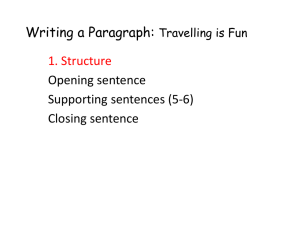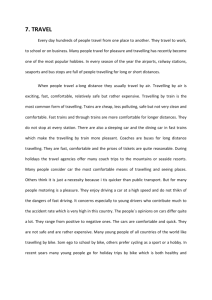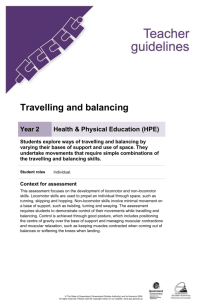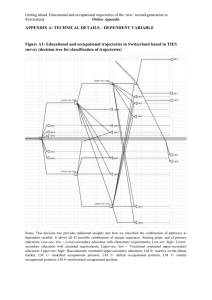Guidance for Managing Occupational Road Risks
advertisement
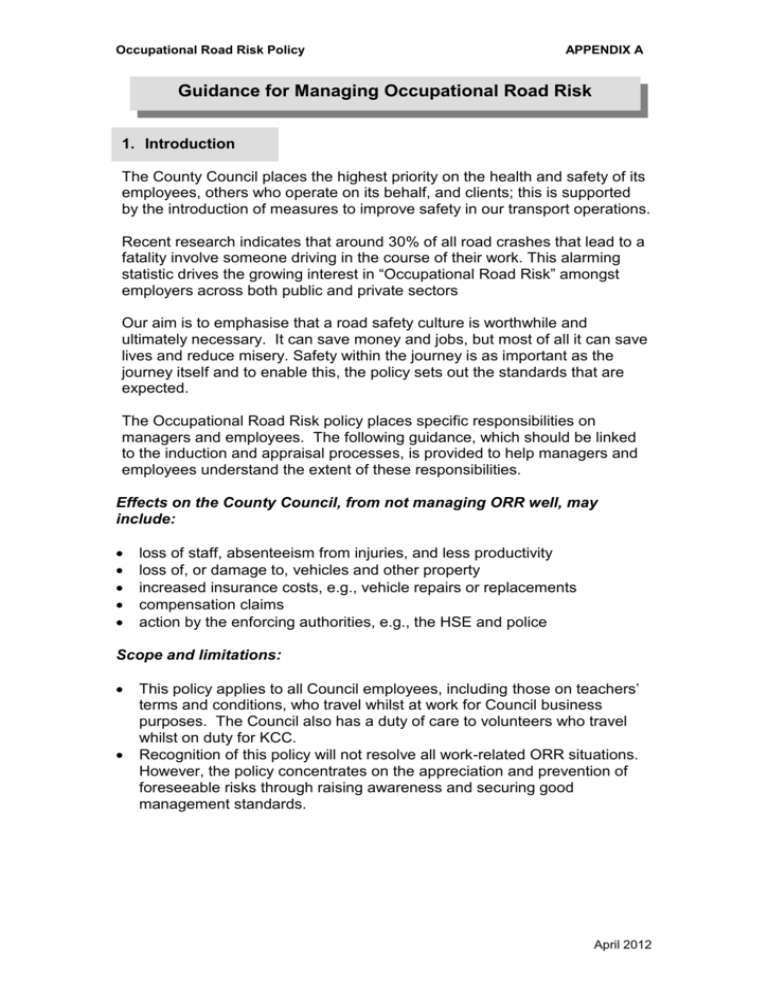
Occupational Road Risk Policy APPENDIX A Guidance for Managing Occupational Road Risk 1. Introduction The County Council places the highest priority on the health and safety of its employees, others who operate on its behalf, and clients; this is supported by the introduction of measures to improve safety in our transport operations. Recent research indicates that around 30% of all road crashes that lead to a fatality involve someone driving in the course of their work. This alarming statistic drives the growing interest in “Occupational Road Risk” amongst employers across both public and private sectors Our aim is to emphasise that a road safety culture is worthwhile and ultimately necessary. It can save money and jobs, but most of all it can save lives and reduce misery. Safety within the journey is as important as the journey itself and to enable this, the policy sets out the standards that are expected. The Occupational Road Risk policy places specific responsibilities on managers and employees. The following guidance, which should be linked to the induction and appraisal processes, is provided to help managers and employees understand the extent of these responsibilities. Effects on the County Council, from not managing ORR well, may include: loss of staff, absenteeism from injuries, and less productivity loss of, or damage to, vehicles and other property increased insurance costs, e.g., vehicle repairs or replacements compensation claims action by the enforcing authorities, e.g., the HSE and police Scope and limitations: This policy applies to all Council employees, including those on teachers’ terms and conditions, who travel whilst at work for Council business purposes. The Council also has a duty of care to volunteers who travel whilst on duty for KCC. Recognition of this policy will not resolve all work-related ORR situations. However, the policy concentrates on the appreciation and prevention of foreseeable risks through raising awareness and securing good management standards. April 2012 Occupational Road Risk Policy 2. APPENDIX A Managers’ Responsibilities 2.1 General Responsibilities 2.1.1 Managers are responsible to their Director for the implementation of this policy to ensure that: an initial and continuing programme of health and safety awareness is undertaken by all employees who drive, ride or walk on Council business; risk assessments are carried out for teams or individuals, depending on the level of risk (see the Travelling at Work Risk Assessment – Appendix C); effective monitoring, including written records, is achieved. 2.2 Specific Responsibilities Line managers must ensure that: they comply with the requirements of the policy employees understand and adhere to the requirements of this policy a ‘Driving at Work’ form (Appendix B) is completed, for all vocational, essential and lease car drivers, where driving is a significant feature of the job, using the ‘Travelling at Work Risk Assessment’ as a guide to assessing the risks that lower risk drivers, eg, lower mileage essential, lease and casual users, are assessed, either using the Driving at Work form, if desired, or the ‘Travelling at Work Risk Assessment’ which is particularly suitable for teams who are exposed to lower risks while driving at work employees confirm that they have documentary evidence of their entitlement to legally use their vehicle(s) on the Council’s business e.g. current motor insurance certificate employees comply with risk assessment requirements (examples given in Appendix C) 3.0 Employees’ Responsibilities 3.1 Employees who drive/ride at work on Council business must: familiarise themselves, and co-operate, with the Travelling at Work Risk Assessment and the Employee Leaflet. April 2012 Occupational Road Risk Policy 4.0 APPENDIX A Road Accident Reporting Role of the Driver 4.1 The Council requires drivers to report, on form HS157, their involvement in any road traffic accident whilst travelling on Council business. The form must be returned to their line manager within 24 hours of the incident, or as soon as possible (e.g. if off sick as a result of an accident). Role of the Manager 4.2 The manager must: carry out an accident investigation using the KCC Accident Investigation form (HS160) in appropriate cases. send copies of both forms to their Directorate Health and Safety Adviser, and the Road Safety Unit (Strategic Planning Directorate) for monitoring purposes send copies to the relevant Personnel and Development team for retention on the employee’s personal file be conscious of the effects on the employee, and remind them of the availability of the Council’s counselling service (Support Line), for example, where loss of the driving licence has occurred, or they have been involved in a serious road accident Directorate Health and Safety Advisers will provide advice on specific issues as required. April 2012

